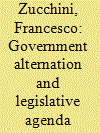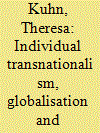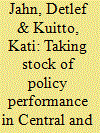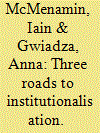|
|
|
Sort Order |
|
|
|
Items / Page
|
|
|
|
|
|
|
| Srl | Item |
| 1 |
ID:
106942


|
|
|
|
|
| Publication |
2011.
|
| Summary/Abstract |
Recent studies of the legislative process have put forward a number of plausible hypotheses regarding the distribution of agenda-setting power. These hypotheses have guided scholars in identifying those conflicts and actors that are crucial to explaining legislative change and the wording of legislation. However, this has not yet led to a better understanding of the choice of specific agenda-setting rules. Why does the cabinet in some parliamentary democracies enjoy an undisputed role, while in others the parliament continues to play the role of co-protagonist? This article attempts to answer this question by looking at some well-known features of party systems. It is argued that in pivotal party systems, with limited government alternation, it is much more difficult to strengthen the government vis-à-vis the parliament. One factor prevents the procedural and institutional predominance of the cabinet under these circumstances: the lack of opportunities for, and expectations of, large and controversial policy change.
|
|
|
|
|
|
|
|
|
|
|
|
|
|
|
|
| 2 |
ID:
106944


|
|
|
|
|
| Publication |
2011.
|
| Summary/Abstract |
Recent trends of mass-level euroscepticism seriously challenge Deutsch's transactionalist theory that increased transnational interactions trigger support for further political integration. While transnational interactions have indeed proliferated, public support for European integration has diminished. This article aims to solve this puzzle by arguing that transnational interaction is highly stratified across society. Its impact on EU support therefore only applies to a small portion of the public. The rest of the population not only fails to be prompted to support the integration process, but may see it as a threat to their realm. This is even more the case as, parallel to European integration, global trends of integration create tensions in national societies. The following hypotheses are proposed: first, the more transnational an individual, the less she or he is prone to be eurosceptical; and second, this effect is more pronounced in countries that are more globalised. A multilevel ordinal logit analysis of survey data from the 2006 Eurobarometer wave 65.1 confirms these hypotheses.
|
|
|
|
|
|
|
|
|
|
|
|
|
|
|
|
| 3 |
ID:
106943


|
|
|
|
|
| Publication |
2011.
|
| Summary/Abstract |
In this article, the probability of opening to trade is related to a country's propensity to learn from other countries in its region. It is argued that countries have different motivations to learn, depending upon the responsiveness and accountability of their political regimes. Whereas democracies cannot afford to be dogmatic, authoritarian regimes are less motivated to learn from the experience of others, even if they embrace policies that fail. Using data on trade liberalisation for 57 developing countries in the period 1970-1999, it is found that democracies confronting economic crises are more likely to liberalise trade as a result of learning; among democracies, presidential systems seem to learn more, whereas personalist dictatorial regimes are the most resistant to learning from the experience of others.
|
|
|
|
|
|
|
|
|
|
|
|
|
|
|
|
| 4 |
ID:
106941


|
|
|
|
|
| Publication |
2011.
|
| Summary/Abstract |
Despite the ever growing body of scholarly work on policy developments in the post-communist New Member States of the European Union (NMS), systematic comparisons of policy outcome performance and its determinants are still scarce. This article identifies patterns of post-communist policy outcomes across the fields of economic, social and environmental policy. By employing pooled time-series cross-sectional analysis with a Fixed Effects Vector Decomposition (FEVD) estimator it investigates to what extent policy outcome performance is determined by differing policy efforts (outputs or reform tracks), transitional conditions and international influences. Although citizens are still negatively affected by the initial economic recession, especially in the social domain, policy reforms and efforts are decisive in determining the outcome performance of the NMS relative to one another in the longer run. Successful and comprehensive market reforms and steering capabilities prove to be particularly important in this regard. Furthermore, internationalisation has an important, albeit ambiguous, impact. While exposure to the world market is reflected in negative policy performance, interaction with and financial commitment from Western European Union countries promote positive policy outcomes.
|
|
|
|
|
|
|
|
|
|
|
|
|
|
|
|
| 5 |
ID:
106945


|
|
|
|
|
| Publication |
2011.
|
| Summary/Abstract |
Party institutionalisation is a central problem in political science. The literature tends to understand it as a syndrome and therefore has difficulty explaining variations. This article suggests a new approach based on the transaction between a legislative party and its deputies, the failure of which is observable in party switching. Three routes to institutionalisation are identified by appealing to the vote-seeking, office-seeking or policy-seeking motivations of deputies. Poland has had a large volume of party switching, along with wide variation in the incentives facing differently-motivated deputies. Survival analyses of switching in four Polish parliaments find that vote-seeking is the most likely route to institutionalisation for Polish parties. Moreover, in this article a concrete hypothesis is established for comparative testing: legislative parties can survive as long as their popular support exceeds 40 per cent of their share in the previous election.
|
|
|
|
|
|
|
|
|
|
|
|
|
|
|
|
|
|
|
|
|